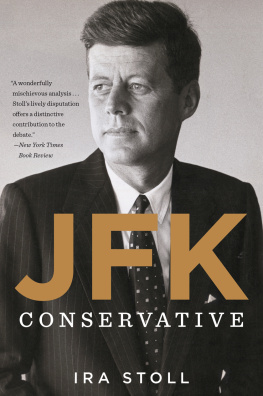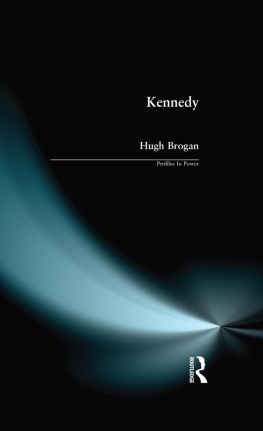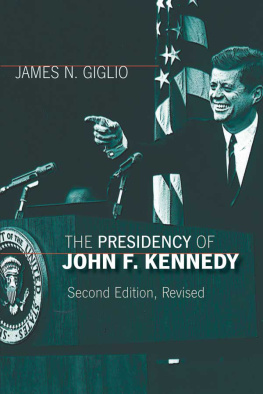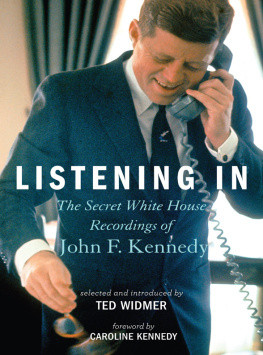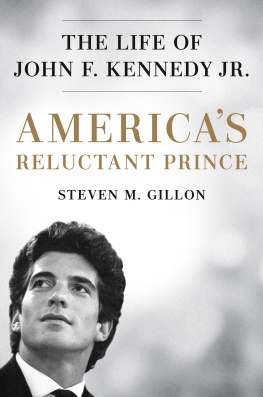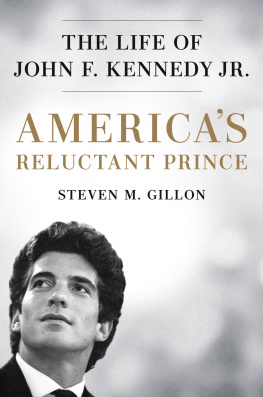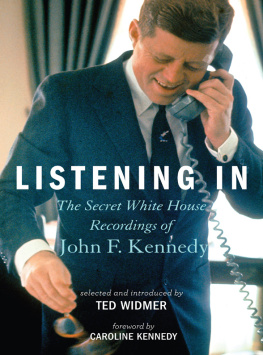
Grace and POWER
THE PRIVATE WORLD of THE KENNEDY WHITE HOUSE
SALLY BEDELL SMITH

RANDOM HOUSE
New York
Contents
PREFACE
They certainly have acquired something we have losta casual sort of grandeur about their evenings, always at the end of the days business, the promise of parties, and pretty women, and music and beautiful clothes, and champagne, and all that. I must say there is something very 18th century about your new young man, an aristocratic touch.
BRITISH PRIME MINISTER HAROLD MACMILLAN ON JOHN AND JACQUELINE KENNEDY AND THEIR WHITE HOUSE CIRCLE
O n November 29, 1963a week after the assassination of President John Fitzgerald Kennedy in Dallas, Texashis widow, Jacqueline Bouvier Kennedy, summoned presidential chronicler Theodore H. White to the Kennedy family compound in Hyannis Port, on Cape Cod in Massachusetts. She wanted White to write an essay about her husband for Life, the magazine that had celebrated the Kennedys in words and photographs for more than a decade.
Jackie Kennedy spoke for four hours, until just past midnight, with composure, a calm voice, and total recall. It was a rambling monologue about the assassination, her late husbands love of history dating from his sickly childhood, and her views on how he should be remembered. She didnt want him immortalized by bitter men such as New York Times columnist Arthur Krock and Merriman Smith, the AP White House correspondent. Well versed in the classics, she said she felt ashamed that she was unable to come up with a lofty historical metaphor for the Kennedy presidency.
Instead, she told White, her obsession was a song from the popular Broadway show Camelot, by Alan Jay Lerner (a JFK friend from boarding school and college) and Frederick Loewe, which opened only weeks after Kennedy was elected. The sentimental musical popularized the legend of the British medieval King Arthur, his wife Queen Guinevere, and the heroic knights of the Round Table. Jackie recounted to White that at night before going to sleep, Jack Kennedy listened to Camelot on his old Victrola. Id get out of bed at night and play it for him when it was so cold getting out of bed, she said. His favorite lines were at the end of the record: Dont let it be forgot, that once there was a spot, for one brief shining moment, that was known as Camelot.
White spent only forty-five minutes writing For President Kennedy: An Epilogue, a thousand-word reminiscence for Lifes December 6 issue. With close editing by Jackie Kennedy (among her numerous alterations, she changed this was the idea that she wanted to share to this was the idea that transfixed her), the piece set forth the Camelot metaphor that has defined the Kennedy presidency for four decades. At an exhibit of Jackie Kennedys designer clothing at the Metropolitan Museum of Art in New York, the John F. Kennedy Library in Boston, and the Corcoran Gallery in Washington in 2001 and 2002, the Lerner and Loewe tune played over and over, a soothing loop of background music.
As a child, Jack Kennedy would devour [stories of] the knights of the Round Table, according to Jackie. After the Wisconsin primary during the 1960 election campaign, he read The King Must Die, by Mary Renault, about the martyrdom of such folk heroes as Arthur in Britain and Roland in France. Given Kennedys middlebrow fondness for show tunes, it was only natural that in May 1962 Jackie invited Frederick Loewe to a small dinner at the White House. At the Presidents request, the composer played the score of Camelot on the piano.
Still, many of Kennedys friends, especially the intellectuals, have tried to dismiss or downplay the Camelot image as inapt and mawkish, suggesting that it would have made the cool and brainy JFK wince. Harvard economist John Kenneth Galbraith said Jackie regretted the Camelot association as overdone. Historian Arthur Schlesinger Jr. called it myth turned into a clich. It had no application during President Kennedys life. He would have been derisive about it. Jackies conversation with Teddy White, he said, was her most mischievous interview. The image was mischievous and legendary... Camelot itself was not noted for marital constancy, and it ended in blood and death.
For those very reasons, Jackie Kennedy might well have wished to retract her words. Although the Arthurian legend evoked battlefield bravery (King Arthur and his knights fighting to regain his kingdom) and idealism (the quest for the Holy Grail of perfection by the knights), it also, as Schlesinger pointed out, featured treachery (Arthurs nephew Mordred seizing his kingdom and taking the queen captive) and adultery (the love affair of Guinevere and Arthurs valiant knight Sir Lancelot).
But Jackie Kennedy never backed away from Camelot. What she wanted to convey was the magic of her husbands presidencyan interlude marked by grand intentions, soaring rhetoric, and high style. At the end of January 1964, in a letter to former British prime minister Harold Macmillan, she conceded that Camelot was overly sentimental, but maintained it was right because those 1,036 days had been a brief shining moment that would not be repeated.
Two years after the assassination, in A Thousand Days: John F. Kennedy in the White House, the book that set the template for the Kennedy years, Schlesinger himself described the periods life-affirming, life-enhancing zest, the brilliance, the wit, the cool commitment, the steady purpose. It was a view that remained undimmed for him, and for many others, despite forty years of tawdry revelations about JFKs reckless womanizing and his administrations decision to enlist the mob to assassinate Fidel Castro.
The picture of the Kennedy White House has been blurred by this competition between the Camelot mythology and the powerful impulse to tear it down. Thousands of books, articles, and television documentaries have created a fun-house mirror in which reflections of the Kennedys jump-cut from clarity to distortion. Hopes had been so high, the romance so strong, and the tragedy so great that the everyday reality of the Kennedy White House seemed insufficiently dramatic.
Because Jack and Jackie were such magnetic stars, their supporting playersand their complex interactions with the Kennedyswere often overlooked or given short shrift. But with the passage of time, emotions have softened, and members of the Kennedy circle, including many who have never spoken publicly before, discussed their years in the limelight with detachment and a sense of perspective. Fresh insights were also drawn from previously unavailable letters and personal papers. The story that emerges, recounted in this book, is more compelling than the Kennedy mythologies. It is a story of people selected by historysome with extraordinary talents, others blessed with the gift of loyaltystruggling to guide the United States through perilous times even as they wrestled with their own frailties and the temptations of power. From the remove of four decades, the Kennedy White House emerges not as a model of enlightened government nor as a series of dark conspiracies, but rather as a deeply human place.
The Kennedys may have been Democrats, full of compassion for the poor and dispossessed, but the image of Jack and Jackie as king and queen surrounded by their court had occurred to many people familiar with the administration. The British political philosopher and formidable Oxford don Isaiah Berlina guest at several private White House dinnerssaw the Kennedys as Bonapartist, finding parallels in Napoleons brothers who, like Robert F. Kennedy as attorney general and Edward M. Kennedy as U.S. senator, held responsible positions in the government. Berlin found further similarities in the aides who served their leader: devoted, dedicated marshals who liked nothing better than to have their ears tweaked. Kennedys men with shining eyes, Berlin observed, had a great deal of energy and ambition and were marching forward in some very exciting and romantical fashion. David Ormsby Gore, the British ambassador during the Kennedy administration and one of the Presidents most intimate friends and advisers, likened the administration to a Tudor Court.
Next page

